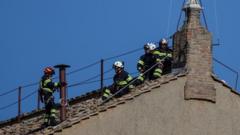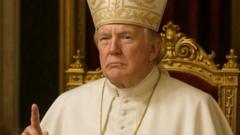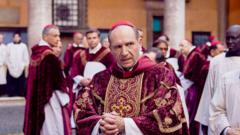In a landscape of evolving religious attitudes, Cardinal Peter Erdo of Hungary has emerged as a central candidate to succeed Pope Francis, embodying a conservative perspective in the Catholic hierarchy.
Cardinal Peter Erdo: A Conservative Contender for Papacy

Cardinal Peter Erdo: A Conservative Contender for Papacy
As a key figure in the Catholic Church, Cardinal Erdo represents traditional values and policies, potentially reshaping the Church's future direction.
Cardinal Peter Erdo of Hungary is gaining traction as a prominent conservative candidate for the papacy. The archbishop has subtly differentiated himself from Pope Francis through his stance on issues such as migration. When over a million refugees surged into Europe a decade ago, Pope Francis' compassionate approach, highlighted by washing the feet of asylum seekers, contrasted sharply with Erdo's initial advocacy for closed church doors in Hungary. He argued that accepting refugees could lead to human smuggling and faced backlash from liberals; however, after discussions with Pope Francis, he shifted his position slightly.
Nonetheless, while he distanced himself from the harsh rhetoric of Hungary's Prime Minister Viktor Orban, Erdo remains a favorite among conservative factions within the Church who are keen to return to traditional doctrines, criticizing what they perceive as a decree of emotionalism under Francis.
Fluent in multiple languages and recognized as an authority on canon law, Cardinal Erdo has focused much of his career on the complexities of the Church’s legal framework, with little direct engagement in the personal struggles of everyday churchgoers. Despite this scholarship, concerns arise about whether his formal background can effectively address the challenges of secularism that continue to permeate Europe. As the Church faces pivotal challenges against declining religiosity, Erdo's perspectives will play a crucial role in defining the future direction of the Catholic faith.
Nonetheless, while he distanced himself from the harsh rhetoric of Hungary's Prime Minister Viktor Orban, Erdo remains a favorite among conservative factions within the Church who are keen to return to traditional doctrines, criticizing what they perceive as a decree of emotionalism under Francis.
Fluent in multiple languages and recognized as an authority on canon law, Cardinal Erdo has focused much of his career on the complexities of the Church’s legal framework, with little direct engagement in the personal struggles of everyday churchgoers. Despite this scholarship, concerns arise about whether his formal background can effectively address the challenges of secularism that continue to permeate Europe. As the Church faces pivotal challenges against declining religiosity, Erdo's perspectives will play a crucial role in defining the future direction of the Catholic faith.




















